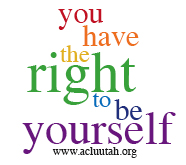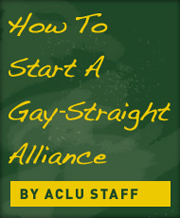Updated June 2017
Click here for a PDF version >>
Introduction
Every year, the American Civil Liberties Union of Utah receives calls from Utah high school students seeking to form student clubs in which they can create a safe, welcoming, and accepting environment for all youth, regardless of their sexual orientation or gender identity. Often called Queer/Straight Alliances or Gay/Straight Alliances (QSAs), these clubs are important resources for lesbian, gay, bisexual, transgender and queer (LGBTQ) students, as well as for those who are perceived by others to be LGBTQ, who are questioning their identity, who have LGBTQ friends or family members, or who just care about LGBTQ issues.
Legal Protection for Non-Curricular QSAs
QSAs are often formed as non-curricular clubs, which are student clubs that are not directly related to a school’s curriculum. In contrast, curricular clubs relate directly to subjects taught in school. The federal Equal Access Act applies to non-curricular clubs. Under the Equal Access Act, if a public high school allows any non-curricular student group access to school resources, then it must provide all other non-curricular student groups--including QSAs--equal access to the school’s resources. If the school treats some non-curricular clubs differently than others, then it risks losing its federal funding.
Can a QSA be a curricular club?
Utah law authorizes school districts to allow only curricular clubs and bar all non-curricular clubs at schools, though the wisdom and constitutionality of doing so is suspect. Utah law, however, does not bar QSAs from forming as curricular clubs. Moreover, the First Amendment prohibits schools from discriminating among curricular clubs because school officials do not like a particular club’s message.
What is Utah law regarding student clubs?
Utah House Bill 236, made part of Utah’s Student Clubs Act in 2007, imposes various requirements and limitations for curricular and non-curricular student clubs, some of which are of particular concern to QSAs. One such limitation is that a club’s intended purposes or activities may not “involve human sexuality.” In the past, lawmakers have hoped that the “involve human sexuality” clause would allow districts to prohibit QSAs while keeping other non-curricular clubs in their schools. This thinking ignores the fact that the focus of QSAs is not sex but issues related to sexual orientation and how to combat unfair treatment and prejudice. Also, if school officials assume that a QSA will discuss sex but other clubs will not, they unfairly (and unconstitutionally) single out a club based on a stereotype.
House Bill 236 also requires parental consent for a student to participate in a club. This requirement is troubling because students who are most impacted by this requirement—those who feel they cannot express gay-positive viewpoints to their parents and those whose parents are not active enough in their lives to sign a permission slip—are the ones who would most benefit from being part of a QSA. Moreover, we believe that the parental consent requirement may be unconstitutional because it allows a third party to prohibit students from exercising their First Amendment right to expressive association by joining a school club. For many students, joining a school club is their first independent exercise of their constitutional rights to expression and association, and they should not have to ask their parents for permission to do so.
The Utah State School Board, local school districts and schools may also make policies relating to student clubs. These policies, however, cannot be more restrictive than the federal Equal Access Act or the First Amendment.
Despite the requirements and limits placed on QSAs and other clubs in 2007, many QSAs have successfully formed at schools throughout Utah in the last several years. Despite these successes, however, the ACLU of Utah remains on alert for any problems faced by existing or new QSAs.
How does a student form a QSA?
Starting a QSA is like starting any other student club. Under Utah law, students must submit a written application for club authorization that includes specific information. Students should ask their school for a list of rules for forming an official student organization and then follow those rules carefully. If they run into any problems, students should document the application process by keeping a record of the dates when they submitted something to the school, how and when the school responded, as well as copies of any material they submitted. The Utah Pride Center may also be able to provide students with support in QSA formation.
If a school denies a QSA application, then the school must provide students with a written statement explaining why. Students then have the right to appeal this decision to “a designee authorized by the school governing board.” Students must file this appeal within ten school days from the date their club application was denied.
Are QSAs permitted in private schools?
Private schools do not have to abide by the requirements of the Equal Access Act or the First Amendment, and they may be able to legally prohibit QSAs.
What can students do if they are having a difficult time forming a QSA, if their QSA application has been denied, or if their school is threatening to disband an existing QSA?
The ACLU of Utah is committed to protecting students’ constitutional rights. We can advocate on behalf of students whose schools are trying to block QSAs or are treating QSAs differently than other student clubs.. Students can contact the ACLU of Utah by filling out our online intake form >>
If you ever suspect that your school is treating you wrong because of your sexual orientation or gender identity:
- Be respectful and follow the rules! Don’t give your school any excuses for treating you badly by behaving badly or losing your temper.
- Document everything! Keep thorough notes about what happened, with dates, names, and any other details that might come in handy. If the school gives you anything in writing or if you submit anything in writing yourself, keep copies.
- Get support! There are groups all over the country for LGBT youth, and if you live somewhere that doesn’t have one, you can probably find an online discussion forum where you can be yourself and get reassurance that you’re not alone.
- Don’t just believe what your school tells you! A lot of the time, school officials either don’t know what the law requires them to do or just figure you won’t question what they say. Find out what your rights under the law are!
Resources
Students! Know Your Rights: A Guide For Utah Public High School Students >>
ACLU information on LGBT issues in schools >>
Utah QSA Network >>
GSA Network >>
Jump-Start: Tools for students and gay-straight alliances >>
Laws and Policies
Equal Access Act >>
HB 236 “Student Clubs Amendments” (PDF) >>
Utah Cases
Additional Information
Resources
- Students! Know Your Rights: A Guide For Utah Public High School Students
- ACLU information on LGBT issues in the school
- Utah QSA Network
- GSA Network
- Jump-Start: Tools for students and gay-straight alliances
Laws and Policies
Utah Cases
June 2012
 Start a GSA Today
Start a GSA Today
Posted 11/4/11 - Gay Straight Alliances are school clubs that aim to create safe and supportive environments for all students. The ACLU of Utah is committed to protecting students’ constitutional rights, and we can advocate on behalf of students whose schools are trying to block GSAs or are treating GSAs differently than other student clubs. Contact us if you are having trouble getting approval for a GSA at your school.